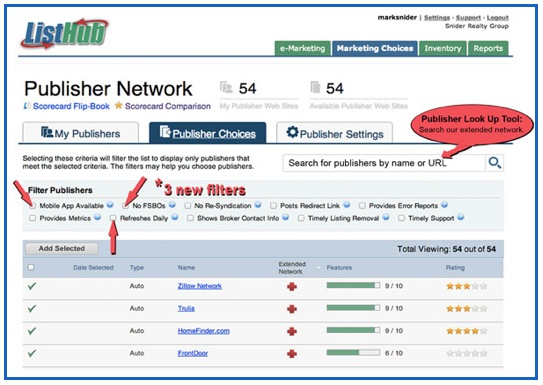
It’s funny. Although I’ve been writing about syndication issues on these pages for oh… five or six years now… looking at all the different angles to that dead horse that won’t die… thanks to a Facebook post I just read, I thought of another new angle. Just goes to show you (well, show me) that you can always find something new, learn something new.
Short version for TL;DR people: Why not let the homeowner make syndication decisions?
Let’s get into it.
A Reasonable Question
Since the FB post is in a group that isn’t open, let me just summarize the issue. A REALTOR in said group asks how to resolve “syndication preferences”. The situation is that the property was listed with a brokerage that provides a direct feed to portals, such as Zillow. That listing was withdrawn, and then relisted with a brokerage that does not. Because the listing was initially withdrawn, the property is showing up as “Off Market” on sites like Zillow.
The local MLS does send a feed to portals, but apparently, a direct broker feed overrides the MLS feed in terms of “priority”.
The REALTOR’s reasonable question/request is why that happens. Why shouldn’t the MLS override everything else?
Once you get over the entire issue of whether to syndicate or not, you do run into these real issues. There is a real question as to which database is the “source of truth” to echo something somebody said recently about some project or another. We might call this the “reference database” problem. If Zillow gets a feed from a broker, then a feed from the MLS, then maybe the individual agent goes in and manually enters data, which one is the “truth”?
One of the stated goals of Project Upstream, for example, is to solve this problem. By having Upstream as the “single source of truth” (aka, the reference database), Zillow and all data users would know that the Upstream feed would override everything else.
Or, we can all decide in some huge meeting somewhere that XYZ will the reference database, whether that XYZ is the brokerage or the MLS or whatever.
So far, so boring. Here’s where things get interesting.
Said REALTOR in a back-and-forth with Jay Thompson, who handles these kinds of questions for Zillow, wrote this:
“We recommended that the client call Zillow and complain directly.”
Ding! Lightbulb!
Why Not Let the Consumer Make the Syndication Decision?
That recommendation, to have the client (i.e., the homeowner whose house is being sold) complain to Zillow directly raises the obvious question: Why not just let the homeowner handle syndication in the first place?
Those of us in the industry know that just about every syndication provider from ListHub to local MLS to Upstream all have something usually called the “Dashboard”. They look something like this:

Such a tool allows the brokerage to pick and choose which websites/apps/whatever gets the listing data. In the example above, a brokerage might decide to syndicate to Zillow, but not to HomeFinder.com.
There is nothing that prevents the homeowner from making this same choice. Put the Dashboard in their hands and let them decide where to send data about their home. After all, it’s their damned house we’re talking about, isn’t it?
The End of the Syndication Wars?
Seems to me that in one stroke, we could solve one of the longest lasting, thorniest, most aggravating problems in the real estate industry.
No longer would there be fighting within the industry about whether to syndicate or not, with some brokerages wanting not to syndicate, but their agents wanting to, or arguments within MLS boardrooms about whether to send data to this website or that portal or whatever. The homeowner would decide.
No longer would things like “syndication preference” or “single source of truth” or some such be an issue. The single source of truth is the homeowner, period, end of story. When he/she puts his/her stamp of approval on a listing, that’s the one that overrides everything else.
We can even solve the “three-headed monster” problem of buyer agents appearing on the listing. Let the homeowner decide whether to allow that or not; disallow it, and you have to pay a fee, just like your agent might have to. Allow it, and your listing agent might want to have a long talk with you, but that’s a healthy conversation to have between the client and the fiduciary.
Marilyn Wilson of WAV Group recently wrote a post about this problem:
I came away very angry. I signed a listing agreement with ONE agent, NOT four agents? How dare the other three pretend to know my property when they didn’t have a clue? Once I brought the emotion and personal pride that homeowners feel about their listing, my perspective of the site completely changed.
Well, if she gets to choose whether to have just ONE agent on her home instead of four, then she’s got no reason to complain, does she? Bring that emotion and personal pride in the home, and choose which website gets your listing and under what terms; it’s your home, after all.
The Role of the REALTOR
It is, of course, silly to suggest that letting homeowners make the syndication decision devalues the REALTOR, since a REALTOR does so much more than just provide a conduit to websites. But in case there are such insecure folks out there, let’s spell out the role of the REALTOR and the broker in such a system.
The REALTOR would provide guidance, counsel, and advice to the client on which websites would generate the most bang for the buck. The average ignorant homeowner might just say, “Syndicate everywhere! More eyes the better!” The REALTOR could explain that putting one’s home — emotion and personal pride, remember — on DiscountHouses.com or on TeenageLoveShacksForSale.com might not be in the client’s best interest.
More seriously, the REALTOR might offer some real advice on which websites and apps generate the most visits, most activity, most serious inquiries, etc. Just doing that makes the REALTOR seem like a real marketing expert in the eyes of most consumers (i.e., everybody that doesn’t work in the real estate internet space).
The REALTOR might advise the client on whether paying $99.99 (or whatever the price) to exclude other agents is worth doing or not. Arguments both ways could be brought up, and the ultimate decision is up to that individual REALTOR and that individual homeowner.
The REALTOR, through her brokerage or her MLS, can provide the Dashboard tool to the homeowner so that he can make his own decisions. And through that same Dashboard, the homeowner would be able to get all kinds of reports on traffic, activity, inquiries, etc. etc. that are available to REALTORS today. The homeowner would likely ask the REALTOR to explain the data and what it means, and voila, yet another opportunity for the REALTOR to shine! It ain’t the data, but the interpretation of the data that matters, after all.
I see so many opportunities for REALTORS to provide value, to impress the client, and to shine here.
Isn’t Upstream Perfect For This?
And when you think about it, isn’t Project Upstream, which wants to be the single source of truth for the industry, be absolutely perfect for this role?
Take the data utility Upstream is building, take the one piece that deals with syndication, and make it into a white-labeled tool for brokers and REALTORS to give to their homeowner clients. Let them make the decision on where, how, when, and under what terms their own home will be shown on various portals.
There is zero interference with the role of the MLS, which is a broker-to-broker network for facilitating cooperation and compensation. It would create huge value opportunities for brokers and REALTORS who are participating in Upstream, as they get multiple opportunities to impress the homeowner (see above). Putting the decision in the homeowner’s hands completely eliminates any hint of anti-trust issues or appearance of impropriety/conflict.
Why Haven’t We Thought of This Before?
So… what do you think? The real estate intelligentsia, the best informed readers in the industry, are all here. 🙂 What do you think?
-rsh



12 thoughts on “What If We Let the Consumer Decide on Syndication?”
Interesting idea, Rob. Devil’s advocate (because that’s what we do here):
Most sellers don’t want an agent to explain in depth how different staging companies work, and then have to choose their own stager. They don’t want the broker to explain the nuances of using the word “cozy” vs. “warm” in the listing. They don’t want a lecture on the pros and cons of different photographers, days of the week to list the home, or which photos will look better in each piece of marketing.
Most sellers want an agent who has the experience to make great decisions for them. They want the process to be as simple and painless as possible. There are obviously exceptions, but most sellers want a transactional pilot, not a passive consultant.
That being said, your solution would remove the potential for listing agents to unnecessarily limit their clients’ exposure due to a personal beef with a marketing portal.
I’d agree that most sellers don’t want to make those decisions themselves, but then the delegation of authority to the listing agent would be explicit.
I see that as no different than the way we handle pre-MLS marketing; the agent sits down with the client, briefs them on the issue, and gets the client to sign off with explicit authorization. It’s a simple conversation:
“Now, would you like to handle the online marketing choices, or do you want me to handle it?”
“What does that mean?”
“Well, you have a range of choices on which websites you want your home advertised on. Some have costs, some are free, and there are a lot of different factors there. It’s your house, so it’s ultimately your call. I have this wonderful tool I setup for you if you want to handle that yourself.”
“Uh, no, that’s ok. Why don’t you take care of it.”
“Great! Just sign right here authorizing me to handle that for you, and I’ll take care of it. But I’ll send you a login to the Client Portal with all the information, and anytime you want it changed, you just let me know.”
—
Under the explicitly authorized avenue, however, we *would* need to create the reference database as the one that has the consumer (or duly authorized agent) imprimatur of approval. That’s not all that hard to do, of course, in this scheme since it would be the Point of Entry system (whether brokerage, MLS, Upstream, or wherever) with the Homeowner’s Seal of Approval on it.
…and any increase in the documentation of clients’ approval of agents making decisions on their behalf would be an improvement.
Customer is king – Who is the customer of the MLS? Last I saw, it’s the member brokers that pay to create the MLS and it’s up to them to decide how to best manage it.
The end game of syndication websites is a non-MLS universe with no guarantee of payment to brokers representing buyers and no rules on data integrity. If that’s the way things go, so be it, but I think there are some pretty compelling reasons to keep the speed bumps in place from both a business and consumer protection standpoint.
You need to change the ROB icon to a vulture. This is a WAY dead horse. Thanks to Sam for some very on the mark comments.
It all makes about this much sense.
https://youtu.be/Yx_7xjpySK0
Jay from Zillow Group here, but speaking now as a former brokerage owner:
When I actively sold real estate and ran my brokerage, we always fully explained to clients what our marketing plans were, and they had input on those plans. This, of course, included where we preferred to syndicate listings. The consumer was more than welcome to suggest other sites or decline our preferences. I don’t recall any actually doing that, as we were hired because we knew how to market real estate.
I’d be naive to think every agent and brokerage did this, but I’d like to think most do. I guess I’m not getting why this is a revolutionary thought.
Hi Jay,
I guess whether the idea seems revolutionary or not depends on whether you think giving consumers direct power over search was revolutionary or not. After all, everything you wrote would have applied to the process of looking for a home in say 2006 or so when T and Z were founded….
If the industry would leave this decision to the consumer, the industry would surely get some strange looks as the supposed “home marketing expert”. Why would anyone who wants to sell a property want to limit its exposure to as many potential buyers as is possible? Taking away what the portals offer in that category then relegates the extent of the Realtor’s marketing to a sign, an empty brochure box, an ad in a local homes magazine, an occasional open house and exposure on broker and agent web sites that receive only a fraction of the exposure the major portals receive. And maybe one day the consumer will decide to simply just go to the portals directly. But if they do, they may also “forget” to ask the Realtor for any help to market the property beyond that point.
As a prospective seller, I can think of many reasons why I would want to (so-called) limit exposure to all the various portals, including: issues of trust (or, more accurately, lack thereof; forego prospective buyer confusion and weariness when a single listing shows up 50-60 times in search engine results; intelligent targeting (to increase your visibility, narrow your focus); … and more.
It seems we are only acknowledging only the extremes as possible outcomes: either the client is 100% in charge of the decision, or completely removed from it. There’s gotta be a middle ground where the agent is taking on the role of consultant (advising on the various marketing avenues, when to list, what photography to use …etc), and the client ultimately in charge of the decision. The consultant should transfer knowledge and educate, and the client should be an active participant in the decision making process. I do believe that today’s consumers are far more educated than even 10 years ago; with the right information and data on hand, I believe they can ultimately make the right decision for themselves.
You mean there would no need for nar,the lousy mls’s zillow and all the other parasites that prey on RE Agents,WOW !!! what an interesting concept,you think that the Real Estate Agents could handle as complex a transaction as the sale or purchase of real property without them,you are kidding right????
I see the profession of Realtor to be more and more replaced by online services. Any parallels with travel agents (even that’s a different market)? The question is not “if” but “when”.
Comments are closed.